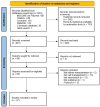Self-Management Interventions for Kidney Transplant Recipients: A Systematic Review
- PMID: 40805950
- PMCID: PMC12345960
- DOI: 10.3390/healthcare13151918
Self-Management Interventions for Kidney Transplant Recipients: A Systematic Review
Abstract
Background/Objectives: For kidney transplantation, it is very important to provide effective post-transplantation interventions to help patients achieve continuous and efficient self-management. Therefore, we review the self-management interventions applied to kidney transplant recipients and suggest the optimal approach to increase the effectiveness of future self-management interventions. Design: Systematic review. Methods: Search terms and strategies included kidney transplantation; self-management; intervention; systematic review. We searched MEDLINE via PubMed, Excerpta Media dataBASE, Cochrane Register Controlled Trials, Cumulative Index to Nursing and Allied Health Literature, and one domestic Korean database to identify studies of self-management interventions for kidney transplant recipients aged ≥ 18 years published in English or Korean until 14 May 2025. Two reviewers independently selected related studies and extracted relevant data. Identified studies were assessed for quality and bias. Results: Of 1340 studies identified, 27 with 1912 participants met the inclusion criteria. Educational interventions were the most common self-management interventions and were provided 3 months to 1 year after kidney transplantation; most interventions were administered by nurses. Outcome variables were divided into cognitive, behavioral, affective, and health outcomes. Educational interventions were effective in improving cognitive, behavioral, and affective aspects. Some differences were observed, depending on the study. Conclusions: We recommend that nurse-involved educational interventions be included when developing self-management interventions and guidelines for kidney transplant recipients in clinical and community nursing settings.
Keywords: intervention; kidney transplantation; self-management; systematic review.
Conflict of interest statement
The authors declare no conflicts of interest.
Similar articles
-
Education support services for improving school engagement and academic performance of children and adolescents with a chronic health condition.Cochrane Database Syst Rev. 2023 Feb 8;2(2):CD011538. doi: 10.1002/14651858.CD011538.pub2. Cochrane Database Syst Rev. 2023. PMID: 36752365 Free PMC article.
-
Interventions for increasing immunosuppressant medication adherence in solid organ transplant recipients.Cochrane Database Syst Rev. 2022 Sep 12;9(9):CD012854. doi: 10.1002/14651858.CD012854.pub2. Cochrane Database Syst Rev. 2022. PMID: 36094829 Free PMC article.
-
Home versus in-centre haemodialysis for people with kidney failure.Cochrane Database Syst Rev. 2024 Apr 8;4(4):CD009535. doi: 10.1002/14651858.CD009535.pub3. Cochrane Database Syst Rev. 2024. PMID: 38588450 Free PMC article.
-
Falls prevention interventions for community-dwelling older adults: systematic review and meta-analysis of benefits, harms, and patient values and preferences.Syst Rev. 2024 Nov 26;13(1):289. doi: 10.1186/s13643-024-02681-3. Syst Rev. 2024. PMID: 39593159 Free PMC article.
-
Interventions for increasing solid organ donor registration.Cochrane Database Syst Rev. 2021 Apr 4;4(4):CD10829. doi: 10.1002/14651858.CD010829.pub2. Cochrane Database Syst Rev. 2021. PMID: 35608942 Free PMC article.
References
-
- United Network for Organ Sharing Current State of Organ Donation and Transplantation: Transplant Trends. United Network for Organ Sharing. [(accessed on 11 January 2023)]. Available online: https://unos.org/data/
-
- National Institute of Organ Tissue Blood Management Statistical Data. Ministry of Health and Welfare. Updated 2023. [(accessed on 23 January 2023)]. Available online: https://www.konos.go.kr/board/boardViewPage.do.
-
- Mayo Clinic Staff . Kidney Transplant. Mayo Clinic Publications; Rochester, MN, USA: 2023. [(accessed on 15 January 2023)]. Available online: https://www.mayoclinic.org/tests-procedures/kidney-transplant/about/pac-....
-
- Erdem C., Cebeci F. Reliability and validity of the Turkish version of the self-management scale for kidney transplant recipients. Rev. Nefrol. Dial. Traspl. 2022;42:117–123.
Publication types
Grants and funding
LinkOut - more resources
Full Text Sources
Miscellaneous


